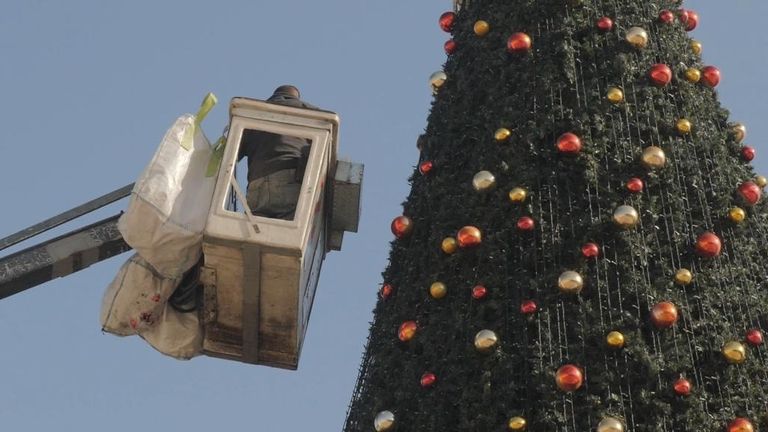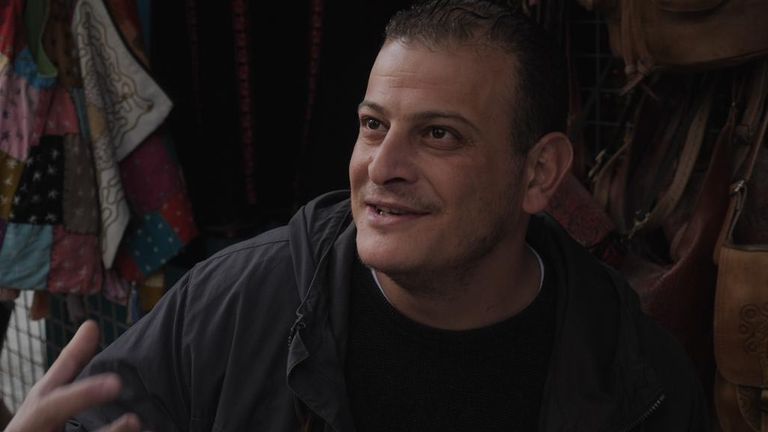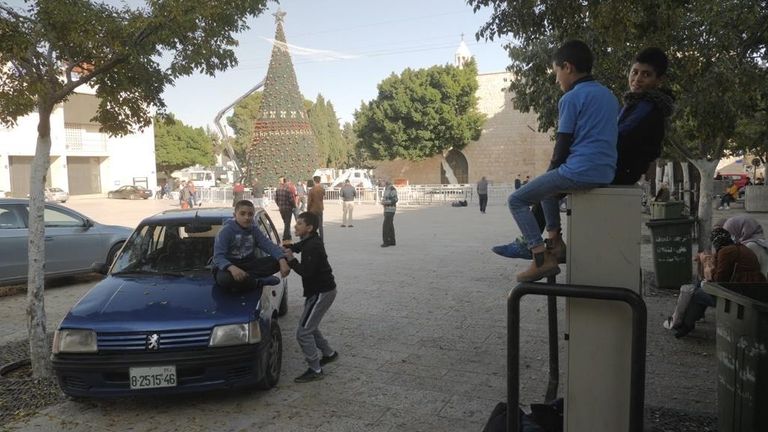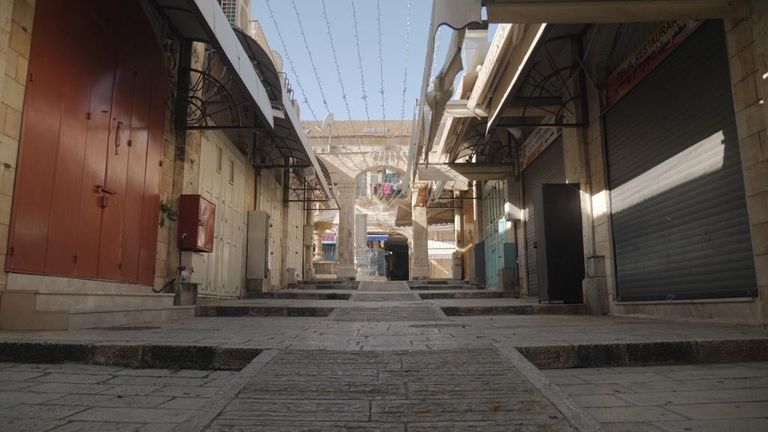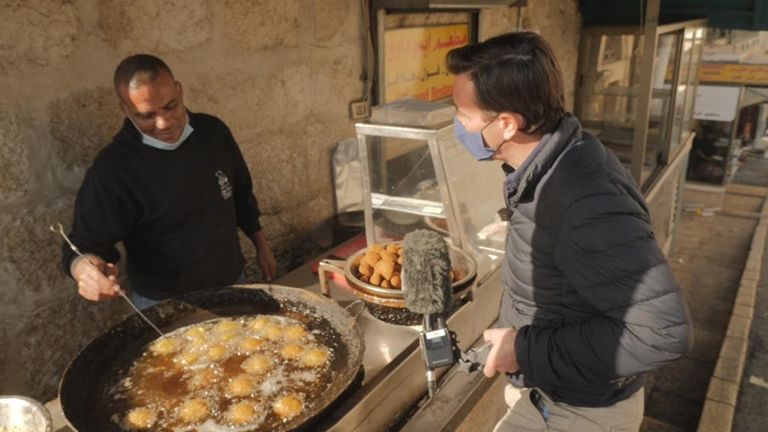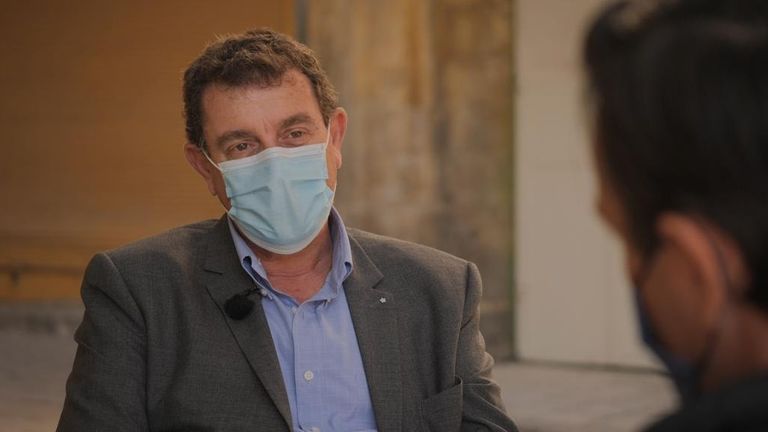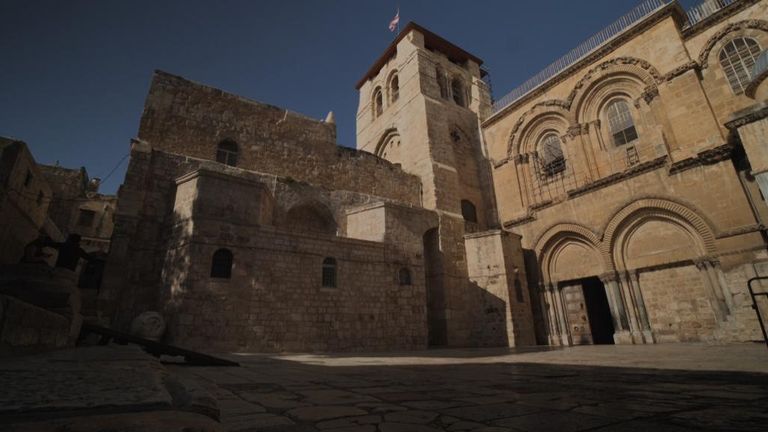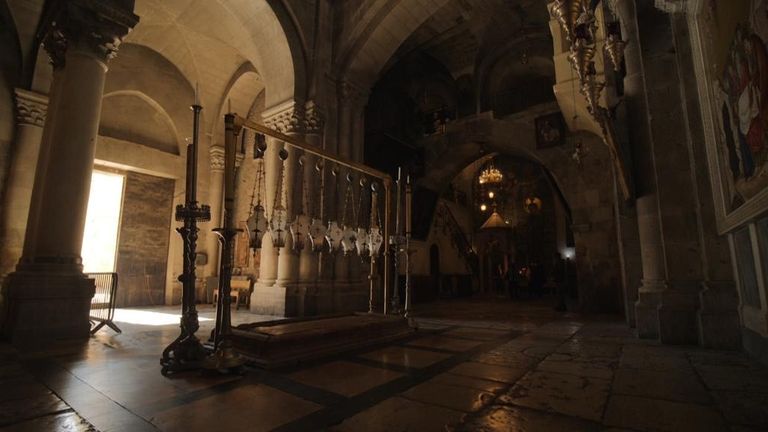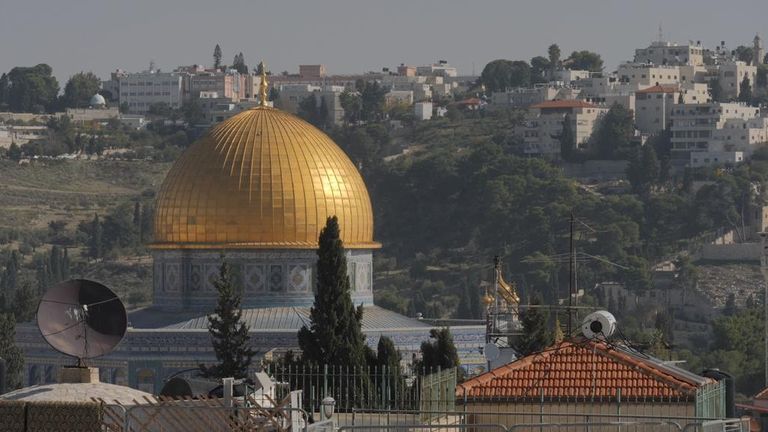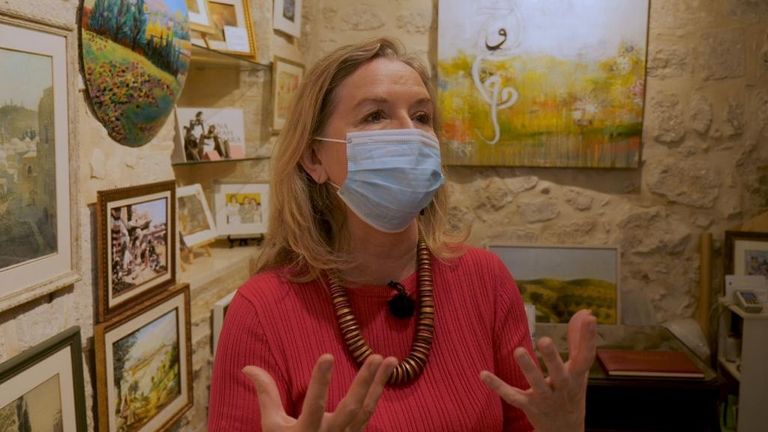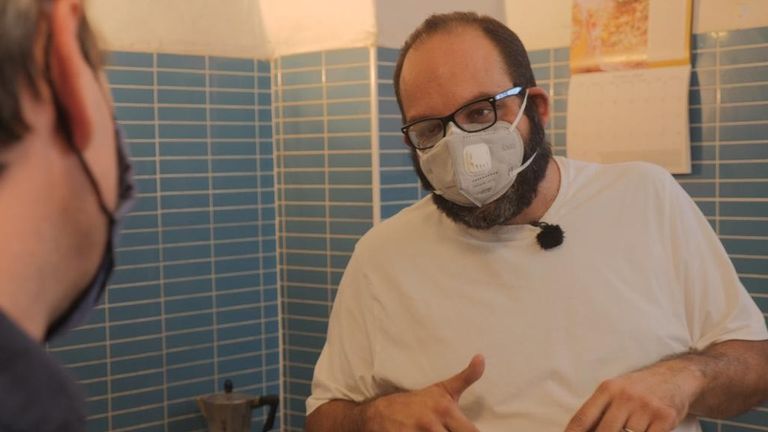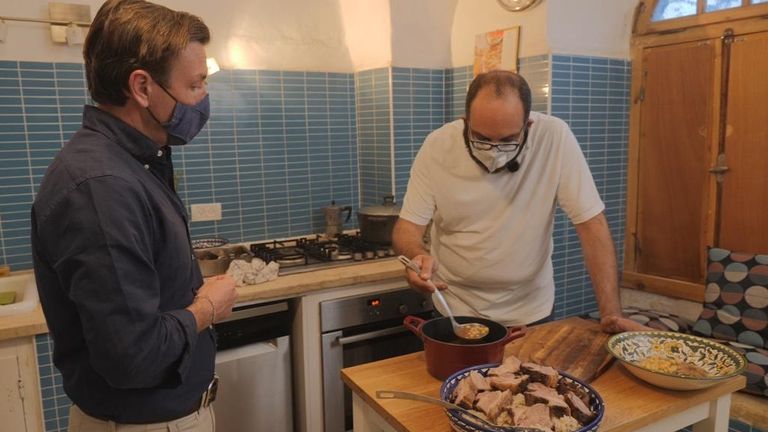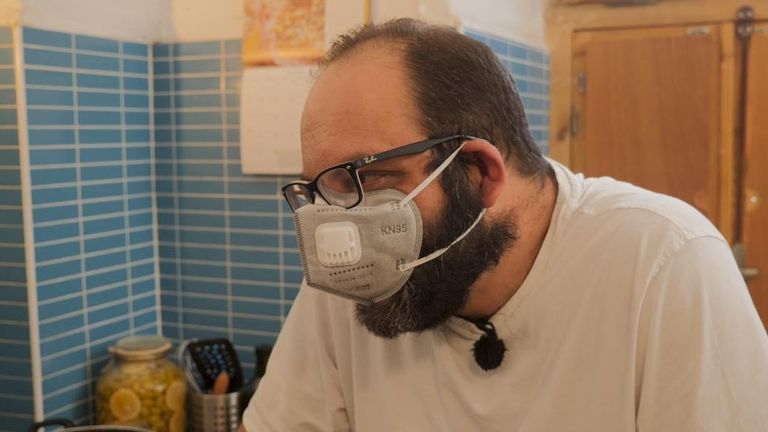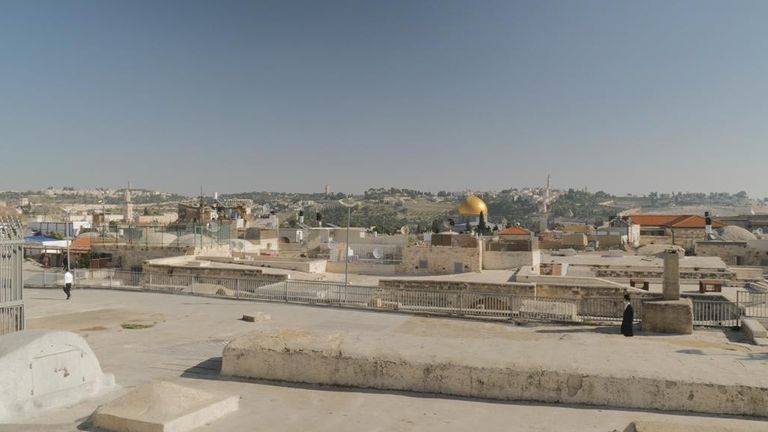Like so many of us around the world, the people of Bethlehem have spent the year in and out of lockdown and they are spending Christmas under a strict curfew.
It has been a devastating year, but Bethlehem is a town built on a story of faith. Its people have lived through huge challenges and on a pre-Christmas visit I have found hope not despair.
“With the lighting of Bethlehem’s Christmas tree… we have conveyed to the world signs of hope, faith and love,” the town’s mayor Anton Salman said as the huge Christmas tree was lit in an empty Manger Square at the heart of the town.
On the square’s eastern edge is the Church of the Nativity, built on the spot where Christians believe Jesus was born. Midnight Mass here draws global visitors. This year, it’s a quiet and subdued affair.
To the west, a narrow alleyway marks the start of Star Street. A walk along here, in normal times, is a struggle; dodging the tourists, the touts and the tour guides with their varying versions of the story of Mary, Joseph, a donkey and a baby.
I live not far from Bethlehem and visit regularly; sometimes for work but mostly with family and friends, for grocery shopping or for a meal.
There are characters here who I have got to know; not well, but well enough to recognise with a ‘marhaba!’ (hi!).
There’s Aladdin who runs one of the Star Street souvenir shops, Ashraf whose falafels on the corner of the square must be the best in town, and Fadi whose restaurant and guesthouse are known far and wide.
“It is tough… really tough,” Aladdin tells me. “For nine month there have been no tourists. Zero… really zero.”
“Have you sold anything today?” I ask.
“Today? Talk in months…. not today. Not in months.”
Yet Aladdin’s tone isn’t despondent, it’s the opposite; it is a tone of faith for the future.
“We have two things here. We have the situation, all the time, all the year here, and we have COVID-19. This virus is stronger than anyone.”
His words reflect an upbeat character you often find among Palestinian people.
“Inshallah, inshallah,” he says; God-willing.
“Let’s just say it’s a gift or something. You say I’m crazy to say that. No I am not crazy to say that.
“COVID-19 made the people think back about how they have to love each other around the world. We are all human beings. If it hurt you it will hurt me. That’s it.”
They live at the heart of a decades-long intractable dispute with Israel.
The advantage is not with them and yet they find hope. COVID-19 seems to have reinforced that.
“We will have hope here. That’s why we are staying here. I still have hope. If not with my generation, the next generation. It will be okay. It will be peaceful. It will be okay.”
I had asked him about the virus, but his answer was as much about the greater struggle for Palestinians as it was about coronavirus.
On the street nearby, Ashraf is moulding a chickpea paste into balls and dropping them, one-by-one, into a pan of bubbling oil.
Each ball plops into the fryer and darkens immediately. Seconds later they are scooped out with a sieve into a pile on the side: Falafel.
“No one came to Bethlehem this year. It’s quiet,” he tells me.
“It’s not the same like every other year. But we hope after this Christmas this problem will be fixed.”
Ashraf is more fortunate than Aladdin. His trade is a product that locals buy. No locals wants Aladdin’s souvenirs.
About 60% of the town relies on incoming tourism. A record three million visited in 2019.
Israel is the main entry point for international visitors. It barred tourists from entering the country in April because of the pandemic and the West Bank’s border crossing with Jordan is also closed to foreigners.
Prime minister Benjamin Netanyahu has recently ordered the country to “close the skies” following the spread of a new variant of COVID-19 in the UK.
Tony Hashram is the president of the Holy Land Incoming Tour Operators Association.
He represents tour operators in Bethlehem and other West Bank cities – Jericho, Nablus, Hebron – but also businesses over the other side of Israel’s separation wall in Jerusalem.
We meet for a socially distanced Arabic coffee.
He has been in the tourism trade for 35 years, in a troubled region, and has never known it to be so tough.
“We never had such a situation even in the first intifada (Palestinian uprising against Israel), the second intifada and the other wars around.
“Eight months is too long for us and our expectations are not good. We know that tourism will not come back for at least another six or seven months.
“We are talking about small businesses, we are talking about medium businesses, we are talking about banks running after businesses who took a lot of loans.”
Tony explains that this sudden drop to zero tourists comes after a few remarkably good years which have exacerbated the challenges now.
“In 2017, 2018 and 2019 we had excellent business and most of us expanded our work. We bought hotels, we enlarged our businesses, we employed much more employees for the huge amount of pilgrims that were coming.”
And then there is the knock-on to the supply chain.
“It’s not only the shops. Tour offices, hotels and beds, guides. Also, bus companies who are only specialised for tourists and pilgrims. The handicrafts – the small factories.
“The businesses related to the tourism industry. The service providers are not only the hotels, guides and buses. There are so many small companies that supply the food, the mechanics, the petrol.
“It’s a whole circle of business. The effect is serious.
“We are worried because some of these businesses have been here for 50, 60, 70 years.
“As tour operators we have around 60 offices and some of them are since 1860. These places are mostly family businesses and generation after generation. It’s very serious.”
In Jerusalem’s old city, he tells me, 30% of the shops might be put out of business.
And his message for tourists in 2021?
“I would say ‘get vaccinated and come’. We love to see you here. We love to see pilgrims, we love to see tourists. We want it to go back to normal. Everybody knows the Holy Land. Everybody knows the area here. Just come! Come back,” he laughs.
For the best paintings of Jerusalem, the Levantine Galley is the place to head.
In the heart of the old city labyrinth, it’s run by Karen Mann, originally from the UK.
“I feel very hopeful and that’s because Jerusalem is a unique site of pilgrimage,” she tells me.
“If you look back through history you see that over hundreds of years pilgrims were coming to this site… they stopped at various times due to wars, due to plague, then during the world wars, the political unrest, the intifadas.
“But they always come back here because this is a unique city and it’s got the sites of faith, of pilgrimage for the three monotheistic religions.”
It’s a refreshingly upbeat assessment of a depressing global experience.
The roofs above the old city alleyways are where you’ll find the best views here. But these days, the spot for the snap everyone wants is deserted.
Back over the wall, in Bethlehem, I’ve a lunch date with the town’s most celebrated chef, Fadi Kattan.
No Christmas is complete without food. And for that, in Bethlehem, look no further than Fadi’s Fauda Restaurant.
“Fauda means chaos,” he tells me. “Nothing to do with the Israeli TV show!”
He explains that the name Fauda stems from his tendency to head to the market every morning and follow his nose.
The result is a chaotic collection of ingredients which transform into his dishes for the night.
We’re standing in a restaurant that’s been empty for months.
“Now it’s a quiet chaos,” he says as we look at his mothballed dining room. “A chaos where we are wondering what’s going to be happening next year.”
He closed the restaurant and guest house on 5 March and since then has had to try to find ways to stay busy, stay afloat and stay sane.
“Just after we closed the restaurant I had to come up with something to stay sane here but also to be able to share what I am doing,” he told me as he produced short-ribs from the oven.
“I am not physically cooking for other people but with how things have changed, through different online platforms, I think I have fed more people over the last few months than I have done in the last five years!
“For me that’s the message of Christmas from Bethlehem. This year, I hope for people wherever they are, if you are cooking, cook a bit more and share with with someone who actually going through a rough time.
“We won’t have massive celebrations but I think solidarity is the real message we should have this Christmas.
“Have a look at your neighbour. Be there.
“Don’t physically be there – stay safe of course – don’t go out and have a meal with all of your neighbours – but if you know of one neighbour who is going through a rough time, cook a larger leg of lamb or have the turkey cut up in a way where you can send them a meal or send a family a meal or something.
“Solidarity… and, being a bit of a dreamer, don’t reduce it to one faith.
“This year I think Christmas shouldn’t be only about the spiritual celebration of Christmas but it should be a human celebration of people standing together. And I hope that will be the takeaway for Christmas this year.”

